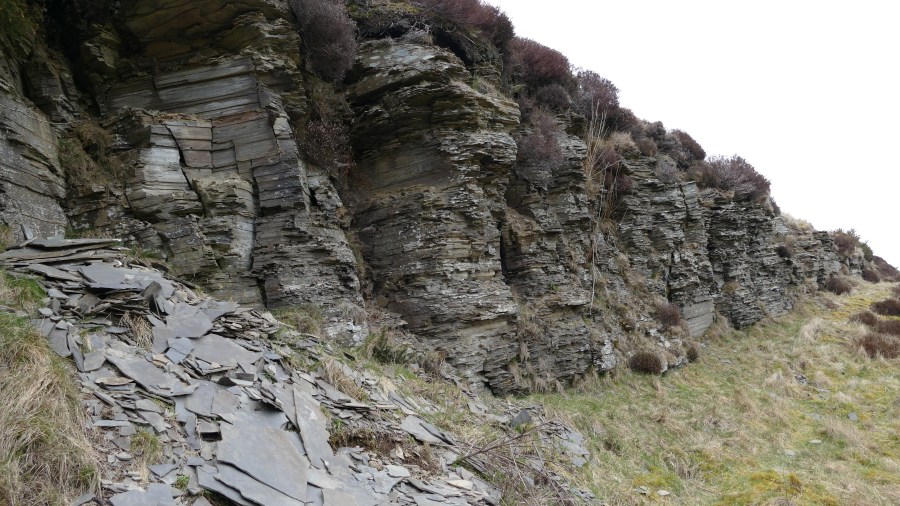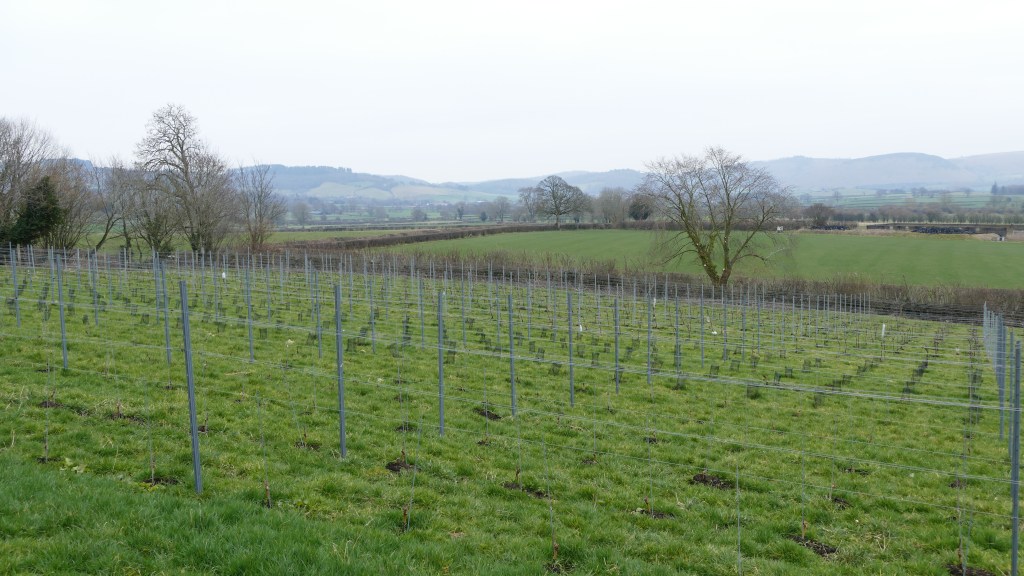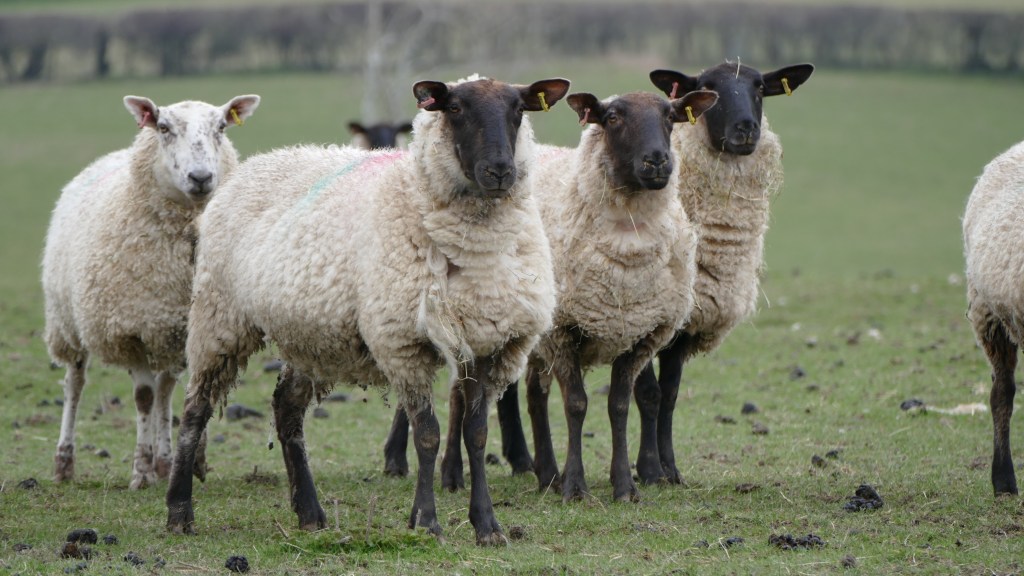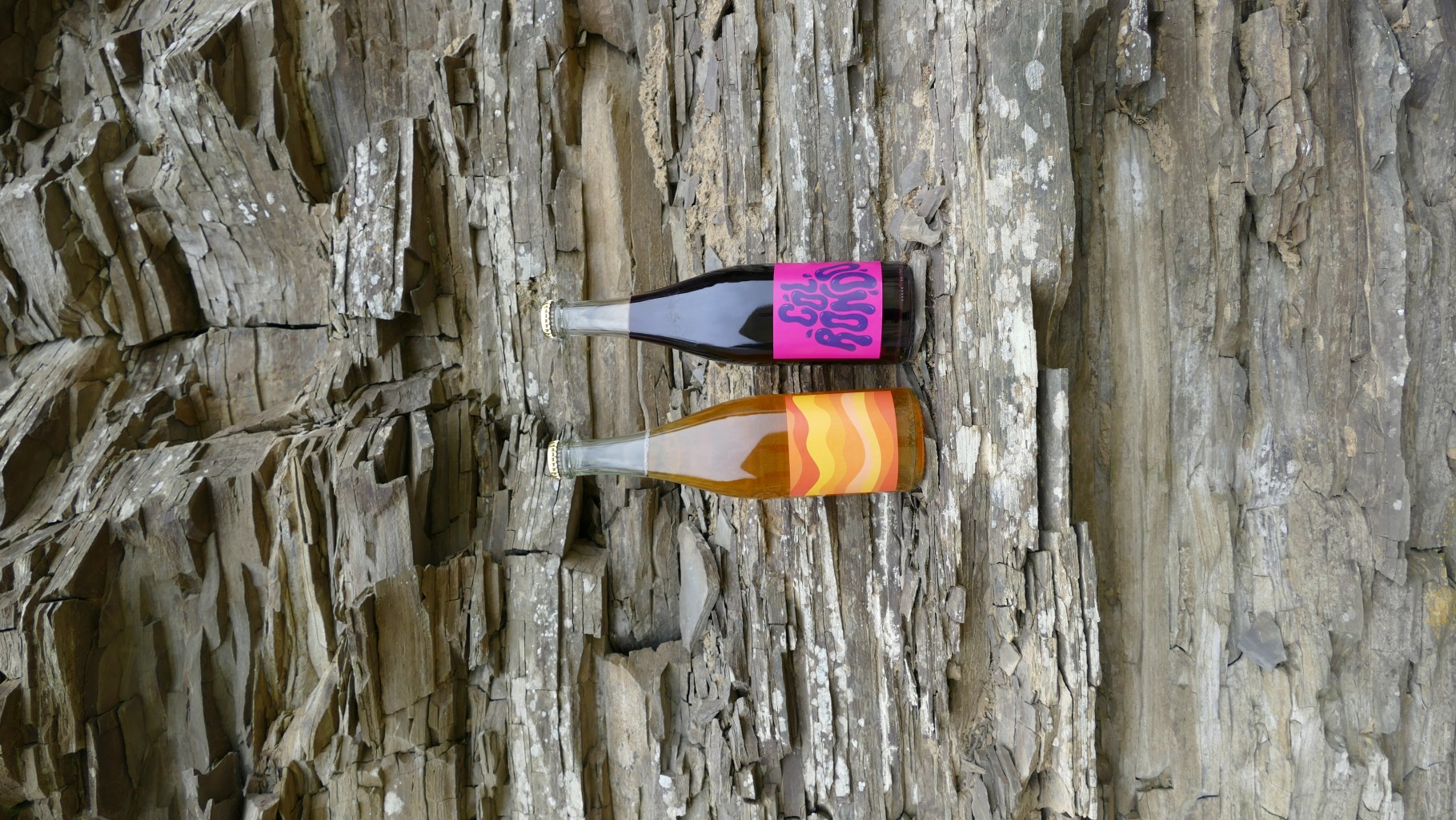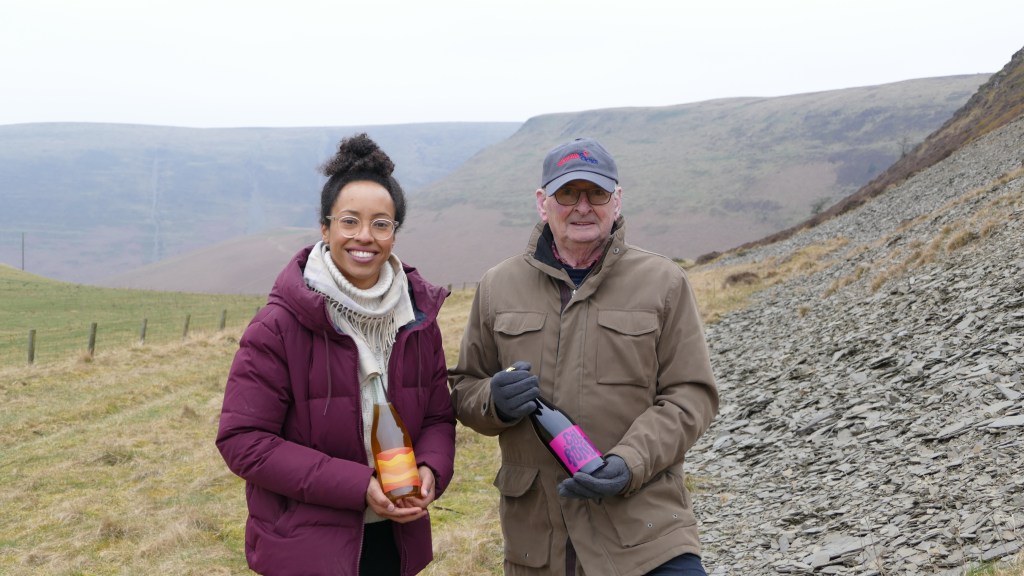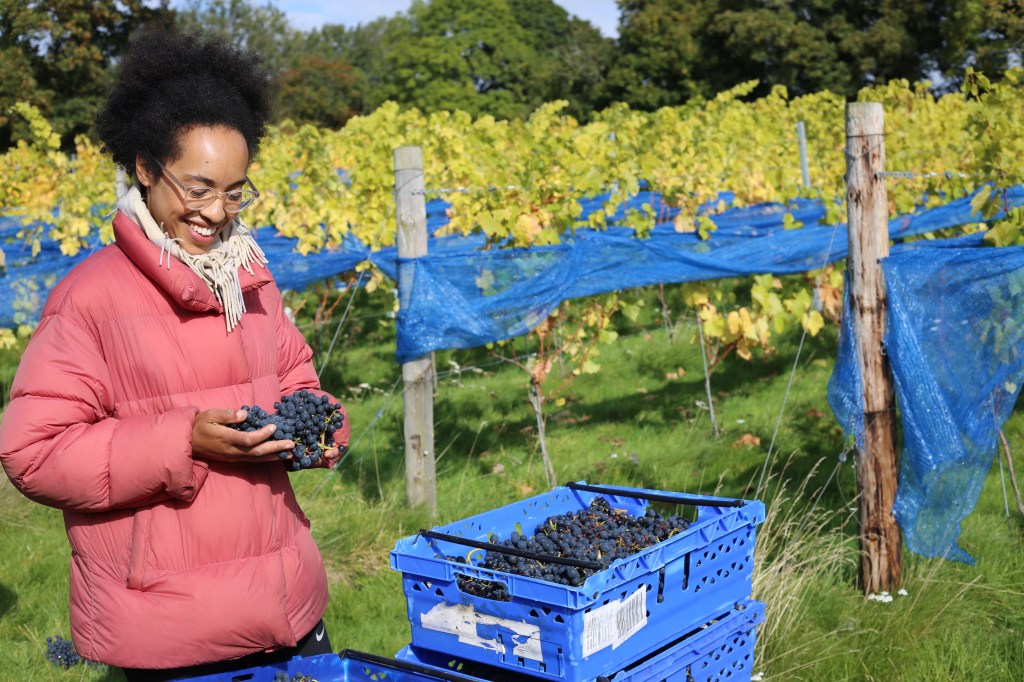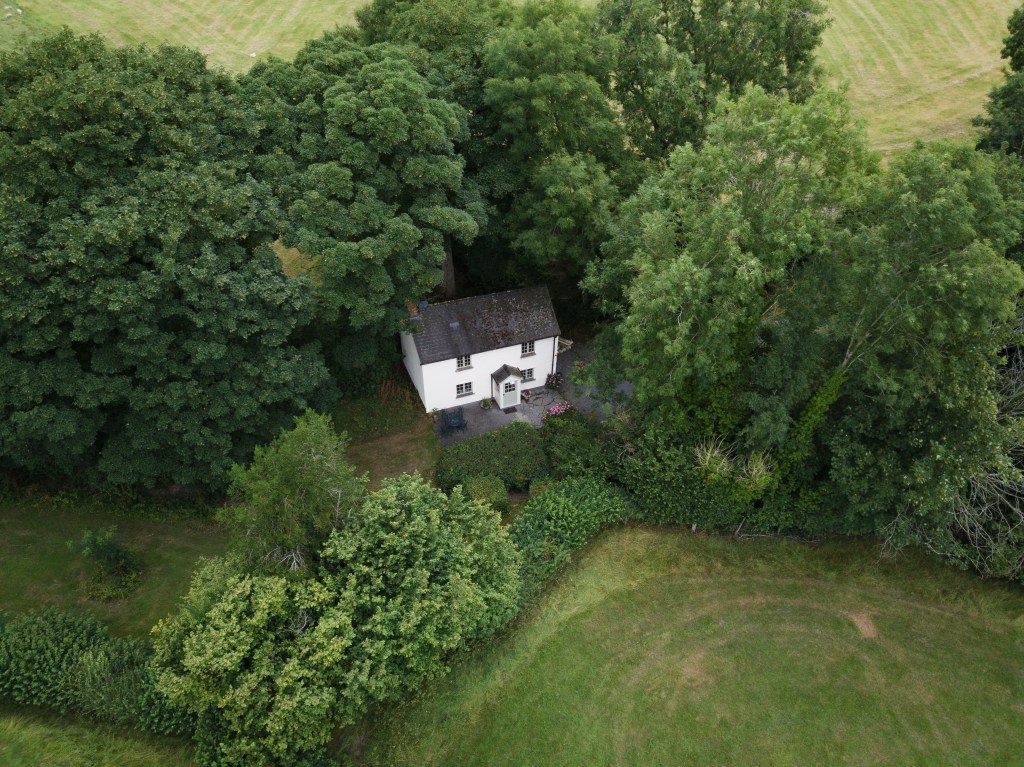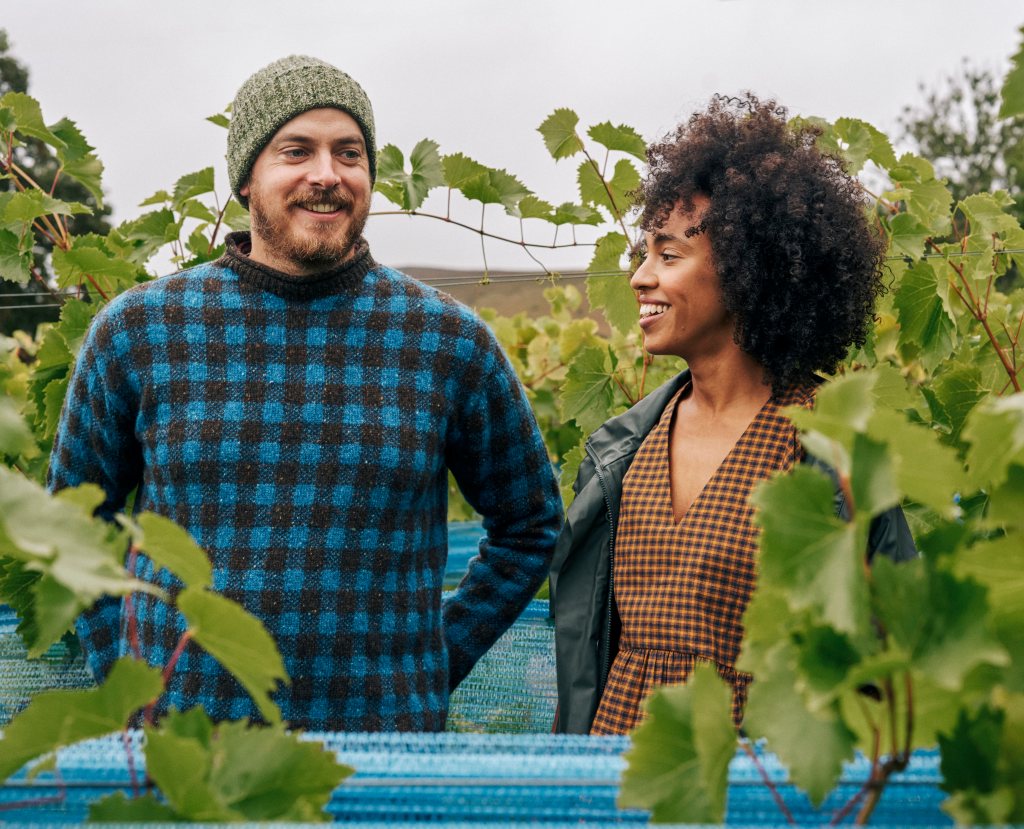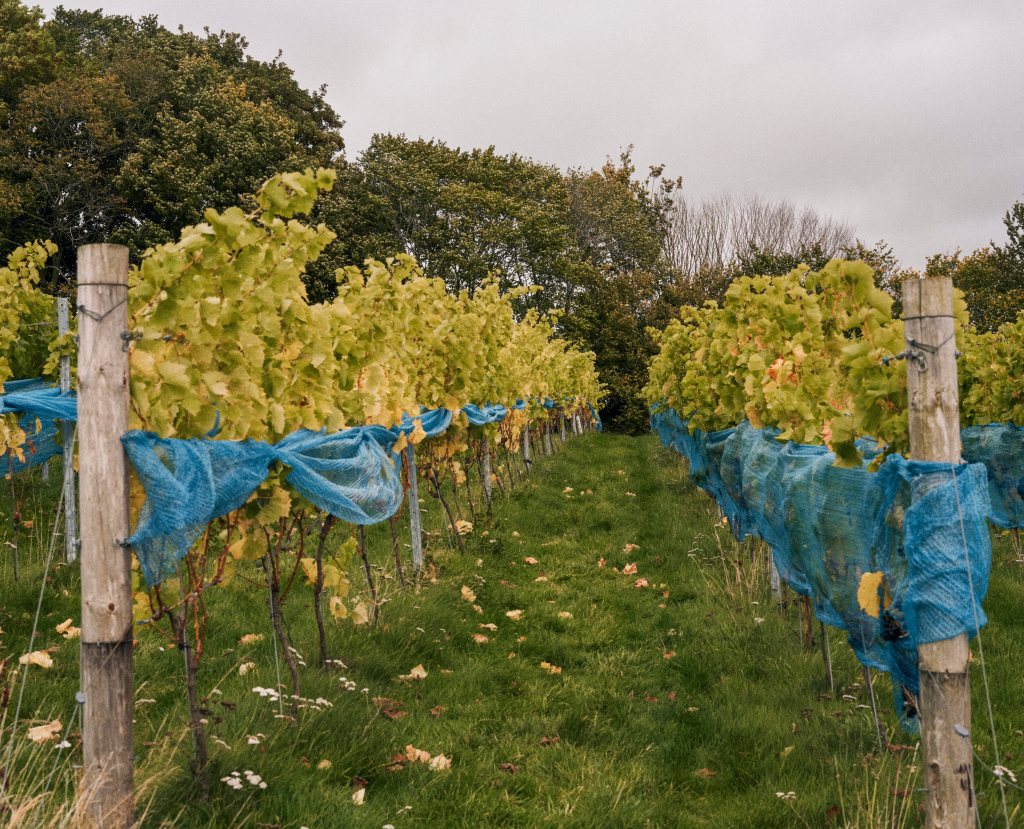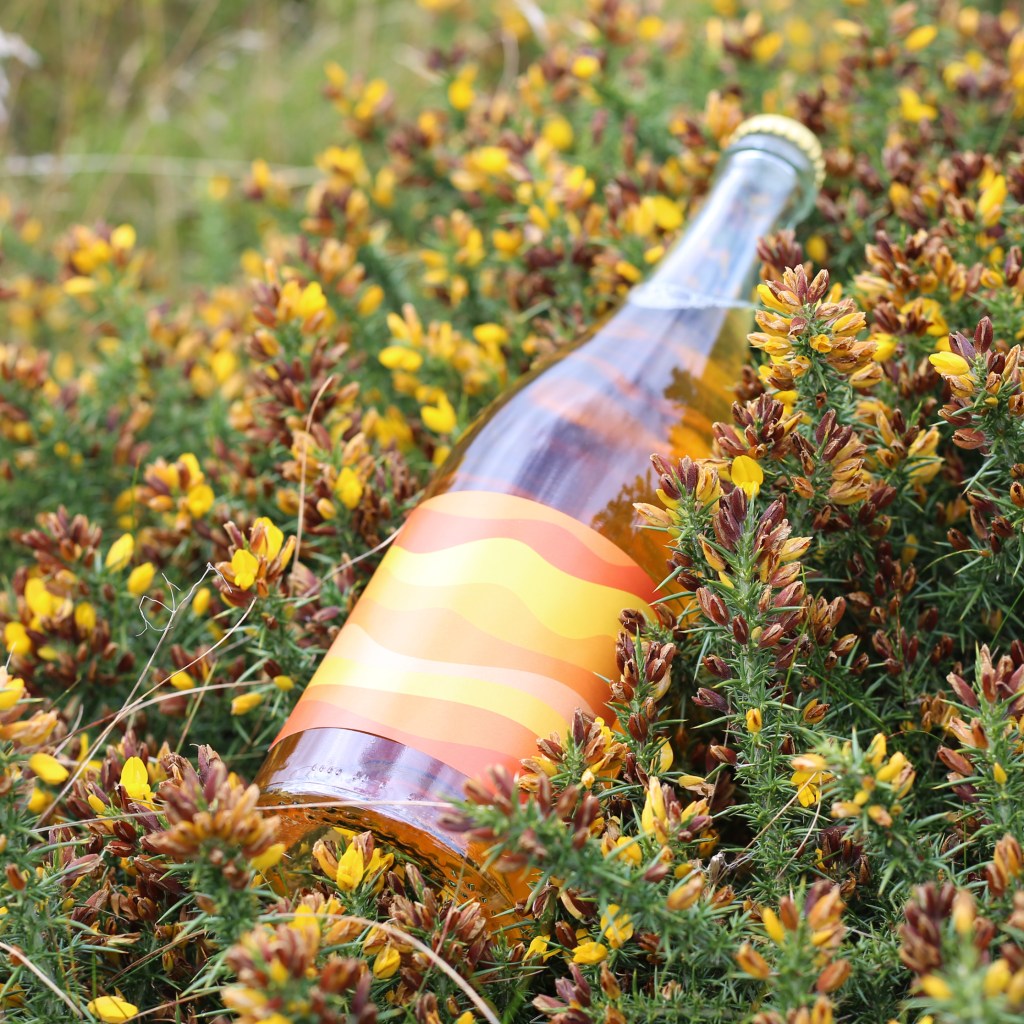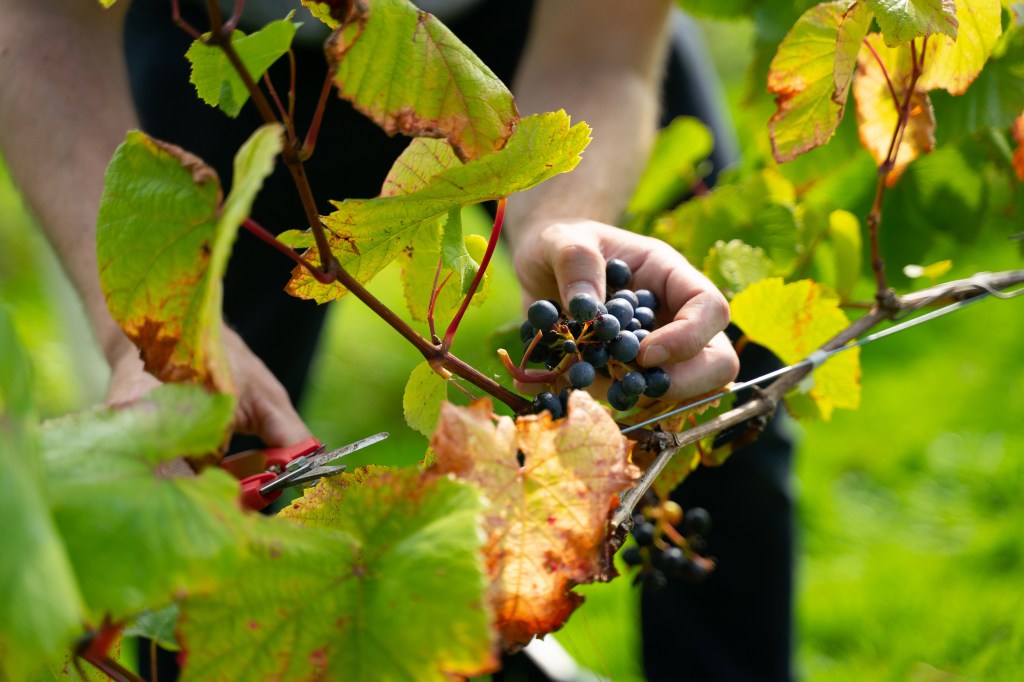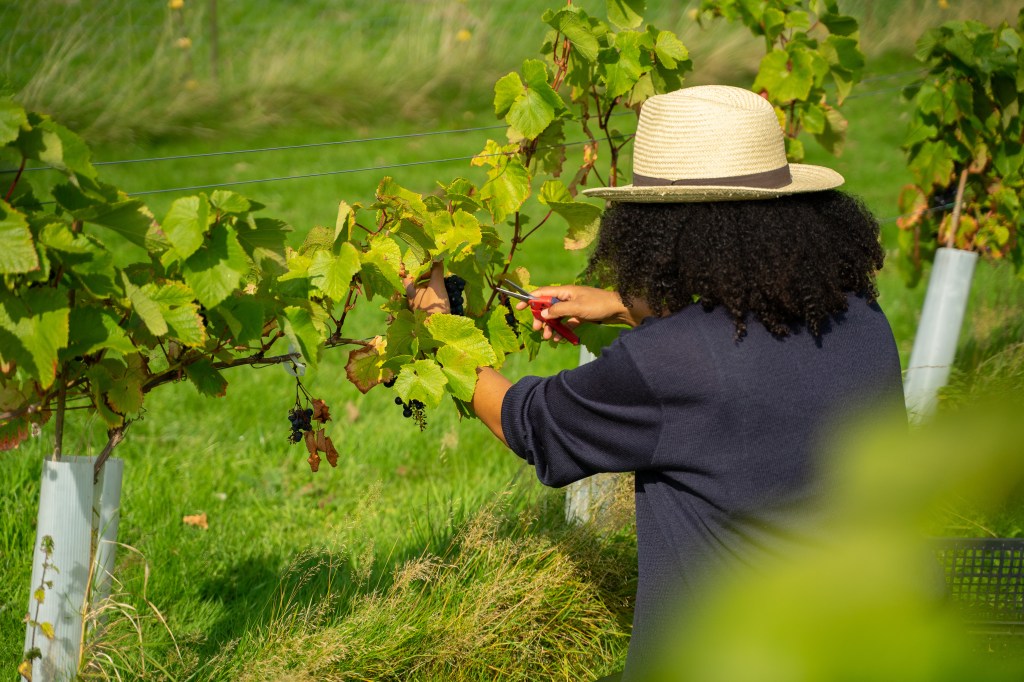Rugged landscape and breathtaking views are just some of the wonders at Whinyard Rocks, a vineyard located on the edge of the Radnor Forest in Powys, Wales. Situated on a farm with a diverse landscape including 125 acres designated as a Site of Special Scientific Interest (SSSI) Whinyard Rocks is a surprising find.
The story behind Whinyard Rocks is as beautiful as its location and perhaps just as diverse.
“It began one night in our flat in London near the Elephant and Castle, James asked ‘how would you feel about us moving to Wales and starting a vineyard?’” Susan Kinsey-Jones explained. This seems a very quiet beginning for such an adventure. James Kinsey-Jones had grown up on his family sheep farm in Wales but moved to London to study. After receiving his PhD James continued to develop his career as a medical research scientist lecturing and presenting at conferences around the globe. “We were able to visit many wine growing regions around the world,” said Susan who at the time worked for a food and drink start-up. Susan is not from a farming background and is from the south east of England and yet has a spirit for adventure and an optimism that is extremely rare. With their combined skills and armed with the fantastic combination of determination and a can-do attitude the couple decided to uproot their lives and the first vines were planted in 2017, which also happened to be the same year that they got married and started a family.
Susan and James both work exceptionally hard. James works at the university of Cardiff and Susan still works as a freelance writer in the food and drinks sector, alongside caring for their young family they also undertake all the tasks in the vineyard themselves everything from fencing to photography.
Since James is a research scientist the couple thoroughly investigated the vines that they considered suitable for the land they had. This led to a decision that took Whinyard Rocks away from planting many of the varieties that are common elsewhere. Solaris, Phoenix, Regent and Rondo were all planted as these hybrid varieties are better suited to the location on the west side of the UK. The site with a loamy soil type is quite exposed “allowing for the leaves of the vines to dry out,” explained Susan. There are a few rows of Ortega in this initial block of vines named The Plock. “A happy accident,” Susan said laughing but this has turned out rather well as these grapes have added to the blend “a flavour of passionfruit and peach that is unexpected.”
“At 250m above sea level, we knew that if we had discussed our plans with a viticultural consultant they would have told us not to do it,” said Susan candidly. Although in the wider area it is obvious to see that this is a region that has long been associated with fruit growing and established orchards can be seen all around. The initial set up cost for the vineyard averaged about £10,000 for the first acre planted in 2017. They planted more vines in another block in 2021.
“Although the expansion of the vineyard is curtailed by the availability of resources there are still plans to double the size of the vineyard in the next two seasons. Currently with 2,500 vines the plan is to plant a further 1,500 vines in May 2023. A field that is currently home to a flock of sheep will be planted with the varieties Bacchus and Muscaris. “We really wanted to plant Caberet Noir this year but we could not source the vines,” said Susan.
“We have more plantings planned for 2024 which will be Pinot Noir Précoce/Frühburgunder and also the Caberet Noir,” she added. James and Susan are aware that with this increase in plantings will come extra work “with money you can be resourceful but time is finite,” she said. Despite this comment there are plenty of future plans at Whinyard Rocks. Food and Drink Wales have provided some funding that allowed the couple to upskill such as taking the WSET level 2 course. “We are also taking an introductory course into biodynamics,” said Susan. I am left bewildered as to how this couple seem to have a knack for stretching the hours in a day.
“Alongside integrating cover crops into our vineyard this year, in an effort to incorporate some biodynamic principles into our work we’re also planning to develop a spray system that uses natural products for nutrition and protection such as herbal teas, milk/whey and essential oils, alongside some ideas for compost – we have made a Johnson-Su bioreactor to develop fungal rich compost, we want to develop a vermicompost system and plan to produce compost at scale for mulching vines,” James explained.
I ask about problems they have faced in the vineyard and it is quite a revelation. “We have not suffered from mildew at all,” said Susan. “We had some frost damage in 2020 and are looking at ways to deal with this, possibly a sprinkler system but James would go through the vineyard and light candles if it was desperate.” Talking about predators it becomes clear that Whinyard Rocks suffered a major set back in 2019. Susan makes an excellent storyteller as she said: “We were sitting in the pub in June (a rare moment of time off) and we received a call… sheep from the neighbouring farm (owned by a cousin of James) had got into the vineyard. When we arrived they had eaten everything green on 800 vines. We call it ‘Sheepgate’.”
At this point it becomes very noticeable that the vines are now surrounded by a sturdy looking electric fence. With the situation unsalvageable James and Susan did not panic but looked instead to 2020. “Initially we thought that ‘Sheepgate’ would set us back 12 months but in reality it has been more than that,” and yet even relating this tale does not put a dent in her optimistic spirit adding that as a couple they are even considering the use of the sheep in the vineyard (either as lawnmowers or as controlled leaf strippers) as part of synergy for the farm as a whole. Considering their history with the vines this seems to indicate a very forgiving spirit although in terms of using the sheep to strip leaves at least they have demonstratable proof that the sheep find the leaves palatable.
The nearby Radnor Forest is known for Red Kites and during the visit these magnificent birds of prey can be seen flying overhead so it could be assumed that bird predation is not a problem in the area but Susan continued: “In 2020 the Phoenix suffered heavy bird predation so now we net all the vines at the end of September. Every year we are learning a lifetime of knowledge.” This continual learning process has also led to the idea of a green harvest. “The Rondo cropped really heavily in 2021 but in 2022 the vines did not perform quite the same so we are looking at undertaking performing a green harvest in the future to prevent stress to the vines.”
The vineyard also has guest accommodation in the form of Highbrook Cottage, a 16th century cottage which was lovingly renovated by James and Susan during the pandemic. Visitors to the cottage will also be amazed by the amount of history they can find in the area. Medieval, Roman and Bronze Age remains are part of the very fabric of the area. Whinyard Rocks is a formation of Silurian shales from which the inspiration for the name of the vineyard is taken. On a drive up to this unique rocky outcrop Eric Kinsey-Jones (who is the third generation of his family to work the land and father of James) points to a Dewey (an elevation that is between 500m and 610m) called the Whimble on which there is an ancient chieftain buried. “From the top it is possible to see at least six counties,” Eric explained. Perhaps this is the reason it was chosen as a final resting place. There can be no argument that the scenery is breath taking and Susan and Eric talk about coming to this beautiful spot to collect winberries (wild blueberries) that find their way into pies made by James’ mum Olwen and also into gin which both sound fabulous. Susan again points to this as something that the vineyard could incorporate into its future offerings.
Conversation turns to the wine which like the vineyard is made in a manner which is low intervention. The wines are made by Mark Smith at Black Mountain Vineyard after Susan and Laura (Mark’s wife) met while both taking their children for medical appointments. To their surprise they both had vineyards and now Whinyard Rocks has a great collaboration with a winemaker who shares their natural, low intervention values. There are currently two wines, a Pet Nat which is 70% Solaris and 30% Ortega, along with a sparkling red wine that is 100% Rondo called Col Rondo (“James loves a play on words,” said Susan smiling) made using the Italian ancestral method (Col Fondo) being re-fermented in the bottle. Using wild ferment with indigenous yeasts and with the bottling processes in the winery undertaken by hand, sealed with a crown cap these wines receive no added sulphur and do not undergo fining or filtration. These natural wines are aimed at younger consumers who are interested in exploring the wine world.
There is a growing market for natural wines and they also have a lower alcohol content than a lot of other wines on the market. “Our neighbourhood near the Elephant and Castle, London had a natural wine bar,” Susan explained.
The branding of the bottles suggests a younger market and the QR code on the bottle leads those drinking to a music playlist that fits with the feel of the wine. James and Susan are passionate about the wines they make and their chosen method of production yet Susan makes clear: “We are not trying to compete with the south east of England.” Visits to the vineyard commence this summer and it will be nice for visitors to enjoy these wines in their ‘natural’ surroundings. The whole experience will give (those who want to) an opportunity to find fun in life.
Susan has an art history degree and has put her skills into creating a playful colour scheme for the labels. The two labels are very different and it becomes clear that whilst they are both from Whinyard Rocks they are both telling their own story. The essence of natural wine is that each bottle has it’s very own unique sense of expression and Whinyard Rocks carry that principle through to their label design. Whinyard Rocks is a place of planned progression and later in 2023 a traditional method low intervention wine made with Phoenix will be released also a still red that incorporates the Regent grape. The future is looking very full for the Kinsey-Jones family.
As the visit comes to a close Susan returns to her storytelling and tells me that legend has it that the last dragon in wales sleeps in the nearby Radnor Forest – perhaps he would like to share a bottle…
- Whinyard Rocks for TOAST
- Whinyard Rocks for TOAST
In conversation…
Whinyard Rocks has a great collaboration with a winemaker who shares their natural, low intervention values. The wines of Whinyard Rocks are made by Mark Smith of Black Mountain Vineyard.
Natural Winemaker Mark Smith of Black Mountain Vineyard, Herefordshire talks to Vineyard magazine and gives his thoughts on the challenges and benefits of being a natural wine maker.
Why have you chosen to make wines in a natural way?
Making the wine in a natural/low input way has really evolved over five or six years. We started off making Traditional Method from 2013 up until 2017, this was made with low additions of sulphur (usually below 20ppm total sulphur dioxide for the finished wine) This wasn’t really something I set out to do but the wines natural acidity and careful ageing meant I didn’t really feel I needed to keep making additions. I also have a friend who is allergic to sulphur and doesn’t really drink wine for that reason, he did try a glass of our wine with no reaction which I guess started me thinking about what goes into a bottle. From there I started discovering styles like Pet Nat/Col Fondo and skin contact.
This thinking was also applied to the vineyard so I started organic conversion in 2018 and have since been working on lots of different techniques to improve the site and soil. In 2018 I also had a really good crop which gave me a bit more freedom to try some of these styles which I found really enjoyable. I’ve ended up focusing on Col Fondo style as it allows me to age the base wines. I like to blend more classic varieties i.e. Pinot Noir/Meunier with skin fermented wines made from Solaris and Siegerrebe. This base wine is then bottled with fermenting must from the next vintage to provide a natural fizz.
As the winemaker experienced what challenges and rewards have you expeienced?
There are challenges in the winery at times. You have less control when working with spontaneous fermentation. This vintage many of the ferments were rapid which can lead to undesirable flavours. I’ve found that racking during the fermentation helps this as well as letting the ferment finish and then adding in some fermenting must. Fermentation is great at cleaning things up. Also giving wines time, this is probably the biggest mind shift for me, not looking for the thing that will fix the problem quickly anymore. Trusting what I’m doing and so far, everything has come through (though this isn’t always easy!)
For me, I think the wines I make now represent the grapes better, through improved flavour and balance, which is very rewarding. However, there are many factors in this like vine age and weather to be considered. I still have a long way to go to get the vineyard where I want it to be which is one of the most challenging aspects as it takes time to improve soil, though it is enjoyable. In the last year I found Korean natural farming which I’ve loved implementing. This method of farming allows me to create many inputs for the vineyard from the local biology and nature. The hope is that I’m able to bring in greater plant, insect and animal diversity and lowering environmental impact. It’s a work in progress!
What are your thoughts on the increase in natural wines both from a global point of view and also for English and Welsh wines in the UK?
I hope that the natural/organic/low input wine movement is something that can have a positive impact on the environment and I think it is a great vehicle for small producers to tell the story behind the piece of land that they farm or the growers they work with. Personally, I find it very exciting to see vineyards with life and diversity and have found that people really engage with it. I rent my piece of land on a 25-year lease, one of my main aims is that I improve it for the next person who farms it. I hope it can continue to grow in the UK, I think producing grapes that are naturally high in acidity can lend itself well to this style of winemaking.
For more like this, sign up for the FREE Vineyard newsletter here and receive all the latest viticulture news, reviews and insight

